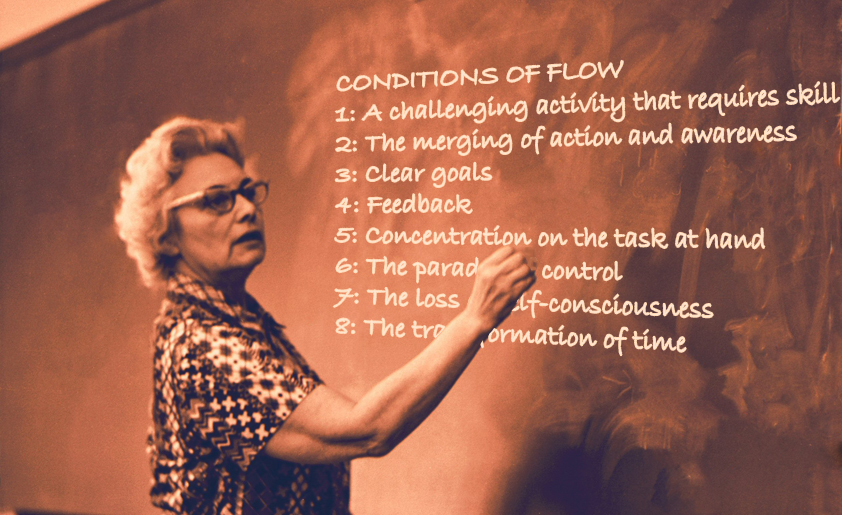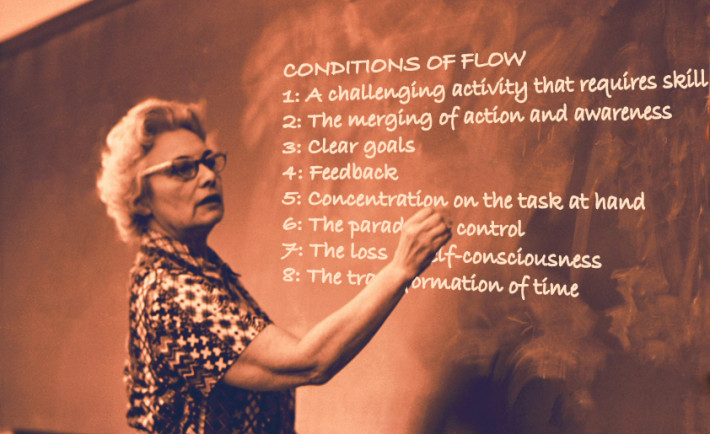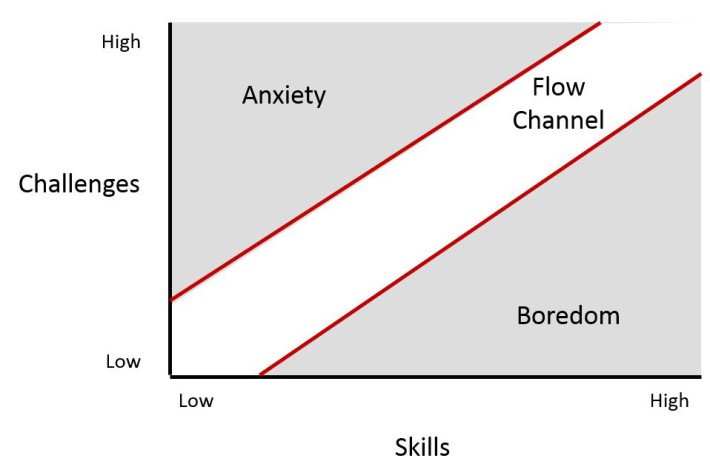How do you enjoy yourself? Learning the 8 conditions of Flow
The holiday season is once again upon us, and with it comes strong recommendations on how we should go about enjoying ourselves. Christmas turns the commercial market into a feeding frenzy as retailers fight to consume 20 to 40 per cent of their revenue in a period that represents 16 per cent of their trading year.
Like putting lures out to prey, marketers educate consumers about what brings enjoyment to life. We are told to eat more because we deserve it and to go on health programs because we are worth it. We are encouraged drink more with friends, responsibly. Buying the latest video game system will make us happier than the one we bought two years ago. We can wear new clothes, go to new places, and own new things, all to make our life better than it is now.
In the midst of the messages, I find myself asking an awkward question: What really brings us enjoyment? Further to this, are we ever really taught how to enjoy ourselves? Or are we dependent on messages from others to find our way?
Thought 1: Enjoyment as common sense
My first consideration when these thoughts entered my mind was that enjoying ourselves isn’t something that should need to be taught. You would think that enjoyment should be common sense. Surely we are centered in who we are and not so dependent on external messages to discover what we deem as enjoyable.
And yet there are whole industries set up to help people understand why they are not enjoying themselves. Professions are filled with psychologists, therapists, counselors, consultants, coaches, pastors, priests, and many others who help people find enjoyment in life. It is as if everyone has the answer and no one knows what it is.
Thought 2: Definitions
My second notion was to question what is meant by the word “enjoyment”. I borrow on Mihaly Csikszentmihaly’s use of the term in relation to his research into what he calls “flow experiences” from his book Flow. This follows on my recent posts about Mihaly’s notion that we have the ability to control our happiness, and that we do this through controlling where we focus our attention and what we do when we become aware of information.
Mihaly makes a point to distinguish enjoyment from pleasure. We general know what brings us pleasure, based on its roots in basic biological needs or social conditioning. Pleasure comes to us with little effort or emotional investment. Enjoyment by comparison can involve pleasure but requires an additional investment of effort to bring a deeper satisfaction. We often stop at pleasure before pressing through to what may be truly enjoyable.
This leads us to the point that enjoyment does not mean the absence of suffering or a continual state of blissful happiness. Indeed, some form of suffering is often a requirement of achieving enjoyment. Ask a marathon runner in the middle of their run if they are suffering and they will likely say “yes”, but they run to pursue what they likely define as a form of enjoyment. Those who tell of living rewarding lives often have stories of deep challenges along the way.
Thought 3: The teaching of enjoyment without suffering
My third consideration was that while it perhaps is not explicitly taught, we do receive constant messages about how we might find enjoyment.
Our parents encourage us to pursue enjoyment through what worked for them while hoping to shield the next generation from the suffering they went through to get to where they are. There is now a growing criticism of upcoming generations that are perceived as entitled, even as the previous generation realises their contribution to the outcomes.
Society directs us to find enjoyment through pleasing others, working our way up a career ladder, or seeking pleasure through financial, physical or emotional pursuits. Society’s messages are not for our personal success, but to ensure conformity and sustainability for the whole. This is achieved through adherence to established rules and class systems. It just so happens that democracy has been able to ensure this stability through a regulated and controlled message of personal fulfillment.
Popular media promises to give us enjoyment if we only support their commercial or institutional motivations, such as eating their food, using their gyms, or attending their meetings. As highlighted by the holiday season, these messages are not in our best interest but are motivated by a desperate fight for survival like starving crocodiles waiting for a herd of bison after a season of drought.
There are many who would prescribe what we should do to enjoy ourselves. But regardless of what we choose to do, are there common conditions inherent to enjoyable activities?
Ownership and eight conditions of enjoyment
A common theme that emerges from the discussion above is that there can be a dependency on others to bring enjoyment as well as blame of others for a lack of enjoyment. This dependency / blame cycle is seen when people attribute their own lack of life enjoyment to their parents, their place in society or career, or to the realisation of the gap between the message and reality of popular media. I take care not to judge this cycle, as shame is a poor motivator for change.
Instead, I ask what enjoyment really looks like. Thankfully there are those in the social sciences who have asked this same question on a grand scale. Mihaly Csikszentmihaly surveyed thousands of people across a wide range of cultures and life situations to ask what it looked like to truly enjoy themselves, or as it is often known to have “peak experiences” or “flow”. What he found was eight conditions most often evident when people reported having enjoyment:
Condition 1: A challenging activity that requires skill
One of the most important conditions of an enjoyable activity is that it has an appropriate level of challenge and requires skill. Mihaly explains this relationship using the diagram below:
If the challenge is high and you do not have the appropriate skill, than you can feel anxiety. A healthy dose of anxiety encourages you to develop additional skills. As you develop those skills, you seek out new challenges to avoid boredom.
Competitive situations fit nicely into this balance of challenge and skill, with one important caveat. If beating your opponent becomes more important than the activity and an end in itself, then the activity itself may no longer be enjoyable. This aligns with Daniel Pink’s research on using autonomy, mastery and purpose instead of carrots and sticks to motivate people.
The need for challenge flies in the face of many of the messages we receive from media and society. Products and services promote convenience. Our career is a progression towards retirement and “the good life”. By removing difficulty, we sterilise our ability to find true enjoyment and drift aimlessly from activity to activity in unsatisfied boredom.
“Enjoyment comes at a very specific point: whenever the opportunity for action perceived by the individual are equal to his or her capabilities. Enjoyment appears at the boundary between boredom and anxiety, when the challenges are just balanced with the person’s capacity to act”
Condition 2: The merging of action and awareness
The second condition of enjoyment is that the activity needs to occupy all of your attention and skills. This is usually a result of the challenge involved with the activity. With all of your focus on the task at hand, there is little room left for unnecessary thoughts such as “Why am I doing this?” or “Should I be doing something else?”
When there is a merging of thought and action, who you are and what you are doing become one. You no longer see yourself as someone separate to what you are doing. Action becomes spontaneous, almost automatic.
A challenge to this is the rise of personal expression through social media. It is difficult to merge action and awareness when we look at what we do through third-person narratives of our Facebook posts, Twitter tweets, or LinkedIn profile. There is a growing critique for us to turn off our phones, practice what is known as mindfulness and be present in the moment.
“Repeatedly we question the necessity of our actions, and evaluate critically the reasons for carrying them out. But in flow there is no need to reflect, because the action carries us forward as if by magic.”
Conditions 3 and 4: Clear goals and feedback
Conditions three and four of clear goals and feedback go hand in hand. Having clear goals is essential to a sense of satisfaction from achieving those goals, even if the goals evolve in complex situations.
Goals are meaningless without clear feedback. Without feedback, it is not possible to determine if you are closer to achieving your goal. Feedback that is vague or misleading may cause you to doubt your goal or get frustrated if your progress is not consistent with your effort.
Feedback is always beneficial if it is an accurate reflection on our progress towards our goal. Unfortunately, feedback is often dismissed or judged harshly if it does not align with our expectations.
“Some people have fragile selves that need constant reassurance, and for them the only information that counts is winning in a competitive situation. Others have invested so much in being liked that the only feedback they take into account is approval and admiration.”
Condition 5: Concentration on the task at hand
The fifth condition is a concentration on the task at hand. A diverse range of information competes for our attention in our multi-tasking lives. It can be difficult to quiet our minds long enough to focus on any one thing.
When we are truly enjoying ourselves, our total concentration is focused. We may have many things running through our mind, like a sailor mentally checking the boat, a climber assessing the wind and the path up the mountain, or a programmer considering all the possible code combination. But their minds are not diverted on anything but the current activity.
There are a few tools available to assist those facing the distractions of office environments. Priority lists combined with time-bounding techniques such as Pomodoro can help maintain focus. Concentration is as much focusing on one thing as it is giving yourself permission to not think about everything else.
“The clearly structured demands of the activity impose order, and exclude the interface of disorder in consciousness.”
Condition 6: The paradox of control
Condition six says that truly enjoyable experiences have what Mihaly refers to as the paradox of control. We have a sense of control because we are fully using our skills. The paradox is introduced based on a perceived sense of risk. If an activity is too safe, then there is no challenge and subsequently no enjoyment.
Gambling is most enjoyable for those who believe (however erroneously) they have some degree of control over the outcomes. Video games are more enjoyable for those who personally identify with the characters and feel a transferred sense of risk. Extreme sports are enjoyable for those who have the skills to control potentially dangerous forces.
It is this condition that highlights the addictive nature of the flow experience. The activity can move from enjoyment to obsession if the risk must continually increase to where the person is no longer in control. In the same manner, the rush from the experience can become a drug, at which point the person loses the ultimate control of choosing whether or not to do the activity.
“What people enjoy is not the sense of being in control, but the sense of exercising control in difficult situations. It is not possible to experience a feeling of control unless one is willing to give up the safety of protective routines. Only when a doubtful outcome is at stake, and one is able to influence the outcome, can a person really know whether she is in control.”
Condition 7: The loss of self-consciousness
In a society often consumed with thinking about self, condition seven comes as a welcome relief. In focusing our concentration and merging our awareness and action, we stop being self-conscious.
We feel more self-conscious when we feel threatened. If we need to eat, we feel hungry. If we need to sleep, we feel tired. If we walk into a job interview, we can feel acutely aware of our words and actions. Yet people who share about being in flow, or fully enjoyable experiences, often talk about forgetting to eat or sleep or not being concerned about what others thought about them.
One of my favourite photos is of a good friend after he finished the Tough Mudder race. He is covered in mud after fighting through four hours and 20-kilometerss of obstacles in the heat of the day. Yet by the look on his face it is clear that he has lost any sense of self-consciousness in favour of being fully in the moment, and thereby being fully who he is.
“There is one very important and at first apparently paradoxical relationship between losing the sense of self in a flow experience, and having it emerge stronger afterward. It almost seems that occasional giving up self-consciousness is necessary for building a strong self-concept.”
Condition 8: The transformation of time
The final condition relates to how time is perceived when you experience a truly enjoyable activity. When we are in the midst of an enjoyable activity, time takes on new meaning. Hours may pass and it can feel like minutes. By the same token, a number of events may seem to happen at once as if in slow motion. In a society that can be a slave to the clock, losing ourselves in the moment can bring its own freedom.
“Although it seems likely that losing track of the clock is not one of the major elements of enjoyment, freedom from the tyranny of time does add to the exhilaration we feel during a state of complete involvement.”
Planning for enjoyment
I do not wish to join the noise of the media in offering recommendations on what you should do to enjoy yourself this holiday season. However, for whatever it is you decide to do now and as you plan your New Year, consider keeping the conditions above in mind:
- Can you introduce appropriate challenge and / or develop additional skill in what you do to keep it interesting? If not, can you seek out new activities that meet your criteria? Can you find an acceptable degree of suffering while managing your anxiety levels?
- Can you become proficient so as to merge your thought and action?
- Do you have clear goals, and is there sufficient feedback to determine if you are closer to achieving those goals? Can you accept the feedback as simply a measure of how well you are achieving your goal?
- Are you able to quiet the noise of life and concentrate on the task at hand?
- Do you feel you have control, while also having appropriate levels of risk?
- Can you take your eyes off yourself and lose your self-consciousness in favour of the activity?
- When you perform the activity, does time melt away?
I write blog posts because for me they satisfy the conditions outlined above. It is my hope that perhaps by reading posts like this you might find your own enjoyment, and thereby making the world a brighter place.
If this is the case, then please share the post around to others who you feel might benefit from some more enjoyment in their lives.





I do wonder if we really “need” to be taught how to enjoy ourselves. I would suggest we need to “relearn” how to enjoy ourselves. I suspect that people are born with the capability to enjoy themselves. I think of my childhood playing with sticks and having to get creative with what was on hand naturally to create most of my enjoyment. A lot of third world kids are similar. When we introduce a plethora of toys, movies, TV and gadgets we begin teaching kids that they cannot be happy without these stimuli. Then it must be more, more, more… more is better these days. Of course it is not, but that is what we are taught. We are taught to create bucket lists of things we “must” do, we have various boards so we can list all of the things we “want” (need?) that will certainly add to our enjoyment of life, we have a media barrage telling us we need those skinny jeans, that holiday to Nassau, that cruise crammed with thousands of people jostling about, the ideal beer… and on and on. We are constantly hammered with clever words and images of what makes life enjoyable, and somewhere along the way, we buy into it. Somewhere along the way we learn to rely on these externals to maintain a facade of enjoyment, forgetting that we are born with an inherent curiosity and creativity that doesn’t really need “all” of those “things” for genuine enjoyment. Though I do admit to enjoying rummaging through old, junky antique stores and reading… and I have no problem with people drinking beer and taking trips. But I do take issue when people buy into the facade and live a shallow existence–can you even call that living?
There are so many reasons not to turn on the TV, not to read most magazines, not to get caught up with what is popular and instead just “be.” Learn to be “bored” in our skin by sitting still for an hour and just “being.” Learn to listen to our inner voice… and for some, learning to listen to a spiritual voice. There is so much one can learn about themselves and the world just by sitting. Perhaps we need to relearn to enjoy our “self” first… get comfortable with “self” before we can embrace life. But that’s probably a discussion for another day.
Well said, Theresa! Learning to be bored , learning to be comfortable in our skin, and in doing so discovering an exciting life. Powerful thoughts!
Hi Chad,
Love this Sideways Blog always makes me think. I am in the boredom area of Mihaly’s diagram. and desire to get into the flow again. When will you put all of this in a book? I would buy it. 🙂
Have an awesome Christmas.
Wayne Stevens
Thanks Wayne!
Most of what I do is distilling many excellent books already there. My book may come as I find my own “voice”. 🙂
I recommend the book Flow, as t gives more detail. In particular, there are some excellent examples of people whose roles did not allow them sufficient challenge or utilised their skills. By re-framing their situation to more align with their strengths, they were able to find satisfaction and enjoyment doing the same things. For example, a retail check-out clerk who made a conscious decision to know three people each day, using her skills in working with people. Another example was a manufacturing floor worker who made each assembly line activity a game to improve his time and quality. As he became more skilled, he was recognised and was able to move to another more challenging role and the company invested in developing more skills.
Finding your way into flow from boredom is an exciting journey, just as finding your way back from anxiety towards a situation more aligned with your skill can be refreshing.
I hope you find your way in 2014!
Chad
Great post – this neatly identifies why I love rock climbing. Now to figure out how to apply that to as many things in life as possible…